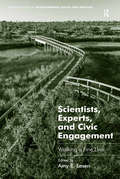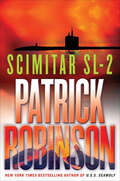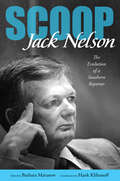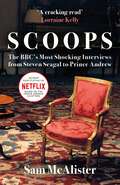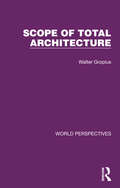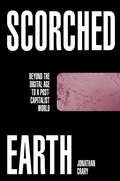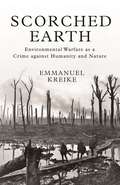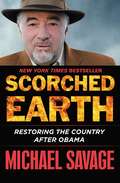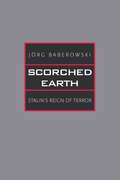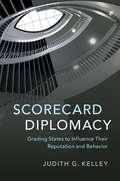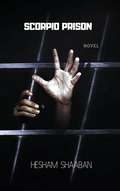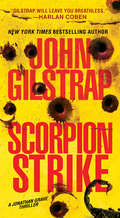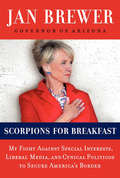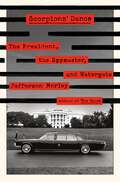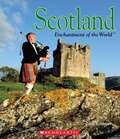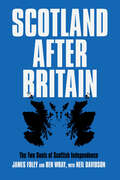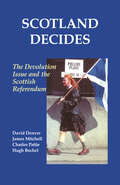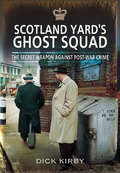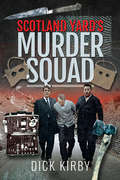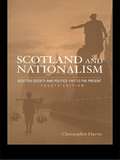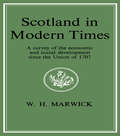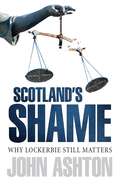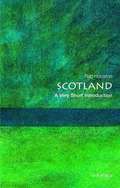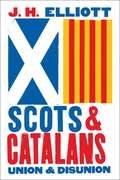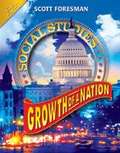- Table View
- List View
Scientists, Experts, and Civic Engagement: Walking a Fine Line (Routledge Studies in Environmental Policy and Practice)
by Amy E. LesenHow do scientists, scholars, and other experts engage with the general public and with the communities affected by their work or residing in their sites of study? Where are the fine lines between public scholarship, civic engagement, and activism? Must academics 'give back' once they collect data and publish results? In this volume, authors from a wide range of disciplines examine these relationships to assess how they can be fruitful or challenging. Describing the methodological and ethical issues that experts must consider when carrying out public scholarship, this book includes a checklist for critical factors of success in engagement and an examination of the role of digital social media in science communication. Illustrated by a range of case studies addressing environmental issues (climate change, resource use, post-disaster policy) and education, it offers an investigation into the levels and ways in which scholars can engage, and how and whether academics and experts who engage in community work and public scholarship are acknowledged and rewarded for doing so by their institutions. Also bringing into the debate the perspective of citizens who have collaborated with academics, the book offers an exploration of the democratizing potential of participatory action research.
Scimitar SL-2 (Arnold Morgan #7)
by Patrick RobinsonTerrorists aim to create a mega-tsunami with a nuclear missile in this military thriller by the New York Times–bestselling author of Barracuda 945.Amid the Canary Islands lies the massive crater of the volcano Cumbre Vieja. Scientists theorize that one day the volcano will erupt, triggering a series of events that will lead to a tsunami higher than any in recorded history. This mega-tsunami, with waves of more than 150 feet in height, would ravage Europe, Africa, and ultimately the East Coast of the United States, causing immeasurable loss of life and destruction . . . After Professor Paul Landon, the world’s most prominent geophysicist, is found with a bullet in his head, it is discovered that Ravi Rashood—America’s nemesis and the former SAS officer who is now the head of Hamas—has hatched a diabolical plot against the West: to fire a nuclear-tipped guided cruise missile—Scimitar SL-2, named for the curved sword of the Muslim warrior Saladin—into Cumbre Vieja.U.S. Admiral Arnold Morgan, the retired National Security Adviser, and the Pentagon know it’s not a joke when Rashood, accompanied once again by his wife, the Palestinian Shakira, explodes Mount St. Helens. Morgan knows something even more horrific is to come. But stopping them won’t be easy.Rashood and his Hamas crew are deep in the ocean, in an undetectable sub, which he managed to procure from Russia via communist China. Perhaps worse, a new president, a weak-willed liberal in the White House, worries about taking a stand. As the terrorists’ deadline approaches, the newly implemented and unseasoned National Security team must consider the unthinkable. They must assume the daunting task of organizing a mass relocation of major population centers along the East Coast to safer ground.Morgan once again finds himself at the center of a desperate cat-and-mouse chase, battling his greatest enemy yet as he races against time to locate the silent underwater marauder and stop Rashood before the unimaginable happens . . . With his trademark authentic research and grasp of military hardware, geopolitics, and cutting-edge science, Patrick Robinson is at the top of his game with this tale.Praise for Scimitar S-2“What Robinson does do . . . is tell a great story, and tell it well, and scare the living vinegar out of you along the way. . . . Scimitar S-2may well be the most frightening book you will read all year.” —Bookreporter.com
Scoop: The Evolution of a Southern Reporter
by Jack NelsonFrom a gullible cub reporter with the Daily Herald in Biloxi and Gulfport, to the pugnacious Pulitzer Prize winner at the Atlanta Constitution, to the peerless beat reporter for the Los Angeles Times covering civil rights in the South, Jack Nelson (1929–2009) was dedicated to exposing injustice and corruption wherever he found it. Whether it was the gruesome conditions at a twelve-thousand-bed mental hospital in Georgia or the cruelties of Jim Crow inequity, Nelson proved himself to be one of those rare reporters whose work affected and improved thousands of lives. His memories about difficult circumstances, contentious people, and calamitous events provide a unique window into some of the most momentous periods in southern and U.S. history. Wherever he landed, Nelson found the corruption others missed or disregarded. He found it in lawless Biloxi; he found it in buttoned-up corporate Atlanta; he found it in the college town of Athens, Georgia. Nelson turned his investigations of illegal gambling, liquor sales, prostitution, shakedowns, and corrupt cops into such a trademark that honest mayors and military commanders called on him to expose miscreants in their midst. Once he realized that segregation was another form of corruption, he became a premier reporter of the civil rights movement and its cast of characters, including Martin Luther King Jr., Stokely Carmichael, Alabama’s Sheriff Jim Clarke, George Wallace, and others. He was, through his steely commitment to journalism, a chronicler of great events, a witness to news, a shaper and re-shaper of viewpoints, and indeed one of the most important journalists of the twentieth century.
Scoops: Behind the Scenes of the BBC's Most Shocking Interviews
by Sam McAlister&‘Riveting&’ Sunday Telegraph &‘Behind every great interview is a great booker – Sam McAlister is one of the unsung heroes of television news&’ Piers Morgan She is the woman who clinched the 2019 interview with Prince Andrew, described as &‘a plane crashing into an oil tanker, causing a tsunami, triggering a nuclear explosion&’. She is many things beside: the first in her family to go to university; a trained barrister; a single mum; a master of persuasion. In her former BBC colleagues&’ words, she was the &‘booker extraordinaire&’, responsible for many of Newsnight&’s exclusives over the past decade, including Stormy Daniels, Sean Spicer, Brigitte Höss, Steven Seagal, Mel Greig and Julian Assange. After 12 years producing content for Newsnight, McAlister reflects with candour on her experience, sharing not just the secrets of how the best news gets made, but also the changes to the BBC, the future of &‘mainstream media&’ in the age of clickbait and the role of power and privilege in shaping our media landscape. This is a backstage pass to the most unforgettable journalism of our times.
Scope of Total Architecture (World Perspectives #5)
by Walter GropiusOriginally published in 1956, this book provides a non-technical analysis of contemporary building by on the of the world’s greatest architects. Published a few years after the end of WW2, it was an inspiring and constructive picture of what kind of living could lie ahead for Western industrial society. This book, the result of many year in the forefront of architectural experiment and achievement by the author, outlines in practical terms the road to improved existence through science, mass production in building and renewed emphasis on the individual.
Scorched Earth: Beyond the Digital Age to a Post-Capitalist World
by Jonathan CraryRefusing the digital world of late capitalism In this uncompromising essay, Jonathan Crary presents the obvious but unsayable reality: our &“digital age&” is synonymous with the disastrous terminal stage of global capitalism and its financialisation of social existence, mass impoverishment, ecocide, and military terror. Scorched Earth surveys the wrecking of a living world by the internet complex and its devastation of communities and their capacities for mutual support.This polemic by the author of 24/7 dismantles the presumption that social media could be an instrument of radical change and contends that the networks and platforms of transnational corporations are intrinsically incompatible with a habitable earth or with the human interdependence needed to build egalitarian post-capitalist forms of life.
Scorched Earth: Environmental Warfare as a Crime against Humanity and Nature (Human Rights and Crimes against Humanity #38)
by Emmanuel KreikeA global history of environmental warfare and the case for why it should be a crimeThe environmental infrastructure that sustains human societies has been a target and instrument of war for centuries, resulting in famine and disease, displaced populations, and the devastation of people’s livelihoods and ways of life. Scorched Earth traces the history of scorched earth, military inundations, and armies living off the land from the sixteenth to the twentieth century, arguing that the resulting deliberate destruction of the environment—"environcide"—constitutes total war and is a crime against humanity and nature.In this sweeping global history, Emmanuel Kreike shows how religious war in Europe transformed Holland into a desolate swamp where hunger and the black death ruled. He describes how Spanish conquistadores exploited the irrigation works and expansive agricultural terraces of the Aztecs and Incas, triggering a humanitarian crisis of catastrophic proportions. Kreike demonstrates how environmental warfare has continued unabated into the modern era. His panoramic narrative takes readers from the Thirty Years' War to the wars of France's Sun King, and from the Dutch colonial wars in North America and Indonesia to the early twentieth century colonial conquest of southwestern Africa.Shedding light on the premodern origins and the lasting consequences of total war, Scorched Earth explains why ecocide and genocide are not separate phenomena, and why international law must recognize environmental warfare as a violation of human rights.
Scorched Earth: Restoring the Country after Obama
by Michael Savage<P>The prophetic author of the bestselling Government Zero, Dr. Michael Savage is back with his most urgent and powerful work. Listeners to Dr. Savage's top-rated radio talk show, The Savage Nation, know him to be an articulate and engaged spokesman for traditional American values of borders, language, and culture. <P>Now, after eight divisive years of Barack Obama, Dr. Savage lays out an irrefutable case for how our nation has been undermined by terrorists from without, by anarchists from within, by a president and politicians with contempt for the Constitution and the law, and by a complicit liberal media. <P>With words and topics that are as insightful as they are timely, he makes an ironclad case for the dangers we face from Hillary Clinton and her fellow travelers in the progressive movement. He also explains why Donald Trump may be one of the two best hopes for America's future as we try to regain control of our government, our country, and our national soul. The other hope? <P>As Dr. Savage explains in some of his most heartfelt and passionate words, it is we, the people: the ordinary "Eddies," as he calls them-motivated, roused, and engaged. This book is about much more than an election. It is a veteran commentator and celebrated raconteur providing a blueprint for how to regain our cherished freedoms and our national identity . . . before they are lost forever. <P><b>A New York Times Bestseller</b>
Scorched Earth: Stalin's Reign of Terror
by Ivo Komljen Prof. Jörg Baberowski Samantha Jeanne Taber Steven GilbertGerman scholar J#65533;rg Baberowski is one of the world's leading experts on the Stalin era, but his work has seldom been translated into English. This book, an unremitting indictment of the mad violence with which Stalin ruled the Soviet Union, depicts Stalinism as a cruel and deliberate attack on Russian society, driven by "totalitarian ambitions" and the goal of modernizing and rationalizing a backward people. Baberowski takes a twofold approach, emphasizing Stalin's personal role and responsibility as well as the continuity he sees in Communist aims and ideology since 1917. Unlike recent apologist accounts that focus on the challenges of modernization or on the operational complexities of managing the Soviet state, this hard-hitting analysis unequivocally locates the origins of the terror in the culture of violence and the techniques of power. Detailed, well-documented, and including many new details on the workings of the Stalinist state, this powerful work encompasses the dictator's brutal reign from his achievement of total power in 1929 to his death in 1953.
Scorecard Diplomacy
by Kelley Judith G.What can the international community do when countries would rather ignore a thorny problem? Scorecard Diplomacy shows that, despite lacking traditional force, public grades are potent symbols that can evoke countries' concerns about their reputations and motivate them to address the problem. The book develops an unconventional but careful argument about the growing phenomenon of such ratings and rankings. It supports this by examining the United States' foreign policy on human trafficking using a global survey of NGOs, case studies, thousands of diplomatic cables, media stories, 90 interviews worldwide, and other documents. All of this is gathered together in a format that walks the reader through the mechanisms of scorecard diplomacy, including an assessment of the outcomes. Scorecard Diplomacy speaks both to those keen to understand the pros and cons of US policy on human trafficking and to those interested in the central question of influence in international relations.
Scorpio Prison
by Hesham Shaaban Naziha MerradThe book title: Scorpio Prison, ( a novel ). The author: Heshem Shaaban. First edition: Cairo, 2016. Deposit number: 9178/2016 I.S.B.N: 978-977-493-255-7. Publisher: Shams for publication and information.
Scorpion Strike (A Jonathan Grave Thriller #10)
by John GilstrapAn island paradise held hostage. A band of dangerous killers unleashed. A sinister plot that could push the superpowers to the brink of war. The perfect formula for explosive suspense in John Gilstrap’s electrifying new Jonathan Grave thriller . . . For Jonathan Grave and Gail Bonneville, the Crystal Sands Resort is the perfect getaway—until gunshots shatter the night. Wealthy guests are yanked out of their sleep, herded like animals, forced to submit to their captors’ demands. But Jonathan and Gail are no ordinary vacationers. The assassins who invade their bungalow receive a deadly surprise. And two determined, skilled operatives escape into the jungle. Jonathan and Gail are not the only free agents on the island. Cut off from his usual tactical team, with a pair of unlikely allies he can’t fully trust, Grave’s only hope of reliable back-up is his partner Boxers, who’s hundreds of miles—and hours—away. It won’t be long before the invaders turn this tropical paradise into the powderkeg that will set off global chaos. Grave may be without weapons, but he’s never without resources. Bold action is the only solution. Like the scorpion, Grave must strike fast and hard . . .
Scorpions for Breakfast: My Fight Against Special Interests, Liberal Media, and Cynical Politicos to Secure America's Border
by Jan BrewerSometime after dark on March 27, 2010, Arizona rancher Robert Krentz was found dead next to his four-wheeler on the grounds of his ranch on the Arizona-Mexico border. Krentz and his dog, Blue, had been missing since that morning. They were last heard from when he radioed his brother to say that he’d found an illegal alien on the property and was going to offer him assistance. The man Krentz encountered that day shot and killed him and his dog, without warning, before escaping to Mexico. It’s difficult to overstate the impact of Krentz’s death, which turned the issue of Arizona’s unsecured border—a crisis that the federal government had repeatedly ignored—into a national concern. As Arizona sheriff Larry Dever said in his testimony before the Senate Homeland Security Committee, “We cannot sit by while our citizens are terrorized, robbed, and murdered by ruthless and desperate people who enter our country illegally.” This momentum helped pass SB 1070, a bill that authorizes local law enforcement under certain conditions to question persons reasonably suspected of being illegal aliens, which Governor Jan Brewer and the state legislature had been working on for months. With the passage of this controversial bill, the state of Arizona became ground zero in the impassioned debate over illegal immigration. The Democrats and the media went into overdrive, denouncing the state and its governor as racists and Nazis.Governor Brewer, a lifelong Arizona resident with deep ties to the community, was first elected to the Arizona House of Representatives in 1982, and hasn’t lost an election since. As a state official, she watched with increasing dismay as illegal immigration exploded across Arizona’s border, and noticed the devastating effect it was having on the state. Causing an escalation in violence, an influx of drugs, and prisons and hospitals to fill to overflowing, this problem was not only wreaking havoc on the moral fabric of the community but placing an even greater strain on Arizona’s beleaguered health, educational, and social welfare networks. Growing frustrated with the failure of the federal government to respond to her pleas for assistance, Governor Brewer led the state to action. Scorpions for Breakfast is Brewer’s commonsense account of her fight to secure our nation’s border in the face of persistent federal inaction. Her book is vital reading for all Americans interested in the real change that can happen when local leaders take the initiative to preserve our country and our laws.
Scorpions' Dance: The President, the Spymaster, and Watergate
by Jefferson MorleyFor the 50th anniversary of the Watergate break-in: The untold story of President Richard Nixon, CIA Director Richard Helms, and their volatile shared secrets that ended a presidency.Scorpions' Dance by intelligence expert and investigative journalist Jefferson Morley reveals the Watergate scandal in a completely new light: as the culmination of a concealed, deadly power struggle between President Richard Nixon and CIA Director Richard Helms.Nixon and Helms went back decades; both were 1950s Cold Warriors, and both knew secrets about the disastrous Bay of Pigs invasion of Cuba as well as off-the-books American government and CIA plots to remove Fidel Castro and other leaders in Latin America. Both had enough information on each other to ruin their careers.After the Watergate burglary on June 17, 1972, Nixon was desperate to shut down the FBI's investigation. He sought Helms' support and asked that the CIA intervene—knowing that most of the Watergate burglars were retired CIA agents, contractors, or long-term assets with deep knowledge of the Agency's most sensitive secrets. The two now circled each other like scorpions, defending themselves with the threat of lethal attack. The loser would resign his office in disgrace; the winner, however, would face consequences for the secrets he had kept.Rigorously researched and dramatically told, Scorpions' Dance uses long-neglected evidence to reveal a new perspective on one of America's most notorious presidential scandals.
Scotland (Enchantment of the World #Second Series)
by Nel YomtovThough it is a part of the United Kingdom, Scotland is home its own distinctive culture and history. Readers will get an up-close view of everything from the natural beauty of the Highlands to the city streets of Glasgow and Edinburgh. They will also explore Scotland's rich history, sample its cuisine, and discover the traditions its people have held for centuries.
Scotland After Britain
by Neil Davidson James Foley Ben WrayWhat is Scottish independence for?Since the referendum, Scottish independence has been captured by conservative forces. Scotland After Britain argues for fidelity to the true meaning of the word independence. It should mean not only a break from the failing British state, but also from the prison of free trade and militarism that has delivered successive crises. Most of all, independence must honestly address the huge injustices of income, wealth and power that continue to define Scottish society, by restoring agency to working class communities and voters. Scotland After Britain shines a spotlight on pro-independence politics since Brexit and the pandemic. The Scottish national question has emerged as the biggest fracture in the British state after Brexit. The independence movement emerged from mass public disenchantment at the status quo, yet the SNP continues governing as if that disenchantment never happened, and the party leadership appears increasingly ambivalent about the risks of demanding independence. Most of all, the British state remains hostile to allowing a second referendum, while the SNP leadership has been unwilling to sanction protest beyond the ballot box. Where do we go from here? Scotland After Britain argues Brexit could force the movement to engage in a reckoning with the true stakes of independence, a process that will inevitably require a breach with the SNP&’s establishment vision.
Scotland Decides: The Devolution Issue and the 1997 Referendum
by James Mitchell Hugh Bochel Charles Pattie David DenverScotland has a parliament for the first time in almost 300 years, and this book is an account of how this came about. The authors trace the origins and history of the demand for home rule in Scotland, focusing particularly on developments following the failure of the first referendum on the issue in 1979, which culminated in a second referendum in September 1997.This major political event attracted national and international interest, and its decisive result was a milestone in Scottish history. This work presents an analysis of the referendum campaign at both national and local levels, including media coverage of the event and the outcome. The reactions of voters are explored on the basis of a large survey of the electorate, and lessons to be learnt about referendums in the UK and elsewhere are discussed.
Scotland Yard's Ghost Squad: The Secret Weapon Against Post-War Crime
by Dick KirbyWhen the Second World War ended, England was bombed-out and starving, with practically every saleable commodity rationed. It was the age of austerity and criminal opportunity. Thieves broke into warehouses, hijacked trucks and ransacked rail yards to feed the black market; others stole, recycled or forged ration coupons. Scotland Yard was 6,000 men under strength but something dramatic had to be done and it was.Four of the Yards best informed detectives were summoned to form the Special Duties Squad and were told: Go out into the underworld. Gather your informants. Do whatever is necessary to ensure that the gangs are smashed up. We will never ask you to divulge your sources of information. But remember you must succeed.They did. Divisional Detective Inspector Jack Capstick, a brilliant thief-taker and informant runner, Detective Inspector Henry Clark, who knew the south London villains as few other detectives did and in addition, possessed a punch like the kick of a mule, and Detective Sergeants Matt Brinnand and John Gosling, who topped the Flying Squad wartime arrests, both individually and collectively. In under four years they arrested 789 criminals, solved 1,506 cases and recovered stolen property valued at 250,000 or 10 million by todays standards, with the aid of their informants, undercover officers and their own, unsurpassed ability.The Special Duties Squad was a one-off. How the four officers accomplished their task is divulged in this thrilling book, using hitherto unseen official documents and conversations from people who were there.
Scotland Yard's Murder Squad
by Dick KirbyGet a behind-the-scenes look at fourteen historic cases from the Murder Squad of Scotland Yard in this collection perfect for true crime fans.In 1906 the Metropolitan Police Commissioner was asked by the Home Office to make available skilled investigators for murder inquiries nationwide as few constabularies had sufficiently skilled—or indeed, any—detectives.Thus was born the Reserve Squad, or Murder Squad, as it later became known. Despite a reluctance by some forces to call upon The Met, the Murder Squad has proved its effectiveness on countless occasions with its remit extended to British territories overseas. A particularly sensitive case was the murder of a local superintendent on St. Kitts and Nevis.A former Scotland Yard detective, the author uses his contacts and experiences to get the inside track on a gruesome collection of infamous cases. Child murderers, a Peer’s butler, a King’s housekeeper, gangsters, jealous spouses and the notorious mass murderer Dr. Bodkin Adams compete for space in this spine-chilling and gripping book which is testament to the Murder Squad’s skills and ingenuity—and the evil of the perpetrators.Brimming with gruesome killings, this highly readable book proves that there is no substitute for old fashioned footwork and instinct.
Scotland and Nationalism: Scottish Society and Politics 1707 to the Present
by Christopher HarvieScotland and Nationalism provides an authoritative survey of Scottish social and political history from 1707 to the present day. Focusing on political nationalism in Scotland, Christopher Harvie examines why this nationalism remained apparently in abeyance for two and a half centuries, and why it became so relevant in the second half of the twentieth century.This fourth edition brings the story and historiography of Scottish society and politics up-to-date. Additions also include a brand new biographical index of key personalities, along with a glossary of nationalist groups.
Scotland in Modern Times
by William H MarwickFirst Published in 1964. Routledge is an imprint of Taylor & Francis, an informa company.
Scotland's Shame: Why Lockerbie Still Matters
by John AshtonThe journalist reveals the scandal behind Scotland&’s Pan Am Flight 103 bombing trial and the questionable conviction of a Libyan terror suspect. The Lockerbie bombing of 1988 remains one of the most notorious acts of terrorism to be perpetrated in the United Kingdom. Its political and foreign policy repercussions have been enormous. Decades later, debate still rages over the conviction of Abdelbaset al-Megrahi, as well as his controversial release in 2009 on compassionate grounds. In Scotland&’s Shame, journalist and researcher John Ashton argues that the guilty verdict, delivered by some of Scotland's most senior judges, was perverse and irrational. He details how prosecutors withheld numerous items of evidence that were favorable to Megrahi. It accuses successive Scottish governments of turning their back on the scandal and pretending that the country's treasured independent criminal justice system remains untainted.
Scotland: A Very Short Introduction
by Rab HoustonScotland's past is too often seen through a film of myths and misconceptions. In this Very Short Introduction, Rab Houston explores the key themes from more than 1,000 years of Scotland's very real and very fascinating history. Covering everything from the Jacobites to devolution to the modern economy, this concise account presents a fully-integrated picture of Scottish society, culture, politics and religion. Houston examines a range of important subjects, including how an independent Scottish nation emerged in the Middle Ages, how it was irrevocably altered by Reformation, how links with England and economic change have affected Scotland, and how Scotland has in turn influenced the development of the modern world. The book shows as well why Scotland's history has made it distinct from England, both before and after Union, and why it has today arrived at a political, social and cultural watershed. Authoritative, lucid, and ranging widely over issues of environment, people, and identity, this is Scotland's story without myths: an ideal introduction for those interested in the Scots, but also a balanced yet refreshing challenge to those who already feel at home in Scotland past and present.
Scots and Catalans: Union and Disunion
by John H. ElliottA landmark account that reveals the long history behind the current Catalan and Scottish independence movements A distinguished historian of Spain and Europe provides an enlightening account of the development of nationalist and separatist movements in contemporary Catalonia and Scotland. This first sustained comparative study uncovers the similarities and the contrasts between the Scottish and Catalan experiences across a five-hundred-year period, beginning with the royal marriages that brought about union with their more powerful neighbors, England and Castile respectively, and following the story through the centuries from the end of the Middle Ages until today’s dramatic events. J. H. Elliott examines the political, economic, social, cultural, and emotional factors that divide Scots and Catalans from the larger nations to which their fortunes were joined. He offers new insights into the highly topical subject of the character and development of European nationalism, the nature of separatism, and the sense of grievance underlying the secessionist aspirations that led to the Scottish referendum of 2014, the illegal Catalan referendum of October 2017, and the resulting proclamation of an independent Catalan republic.
